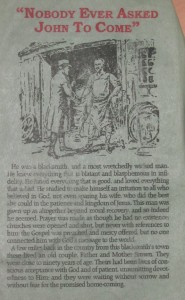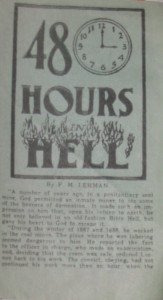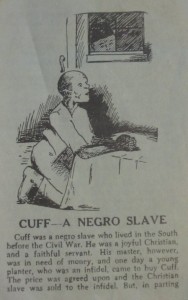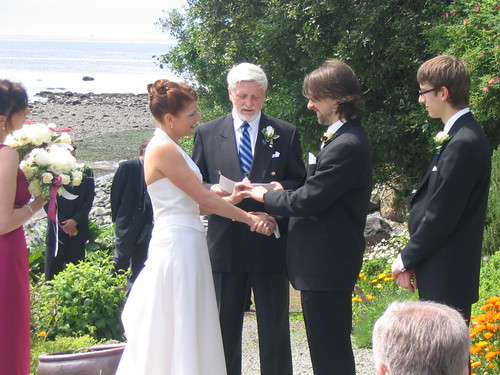There was a bit about sharing tracts in the old Rapture movie I reviewed a few days ago, (just about 6 minutes in) and that made me remember my own small collection of missionary tracts. I picked them all up one night many years ago, while waiting for the bus in downtown Vancouver. They were scattered all over the bus stop bench so I collected them (out of a dislike for littering, both physical and spiritual), and have kept them to this day (out of morbid curiosity and historical interest). Incidentally, just how are tracts supposed to work, anyways? The scene in question in Are You Ready? shows the presentation of a tract leading to a joint reading and friendly discussion, but the reality is quite different: I actually saw a guy drop a couple of tracts off at a bus stop. He didn’t slow down, or look anyone in the eye, just threw his missionary litter down and kept on his way. I remarked to my then-roommate (who was also waiting for the bus) that the missionary guy didn’t look happy—his entire body language was very angry and defensive. I would have felt sorry for him, but I was busy throwing his tracts where they belonged: in the garbage.
Some of my tracts are fairly modern, and thus pretty forgettable. One’s about the Number of the Beast (666, naturellement) and how it’ll be imposed upon us by the Antichrist, and how this is a bad thing. One asks “Are You Free?” (answer: no, ’cos of all the sin). One asks “Will God Let You Into Heaven” (right, with no question mark. Anyway, the answer is: probably not). Another is about “The Horrors of Hell” (briefly: it’s pretty bad). Another, entitled “He Made The Coupling” is set in modern type but with old-fashioned language, used the metaphor of “coupling” between train cars to illustrate the “connection” between us and God. And also that alcohol is bad, mmkay. But three deserve special mention because they’re set with lovely old typeface and nicely old-fashioned language—turn of the century, I’d say—and tell interesting parables that provide a nice window into some Christians’ mindset, past and present.
“Nobody Ever Asked John To Come”

He was a blacksmith, and a most wretchedly wicked man. He knew everything that is blatant and blasphemous in infidelity. He hated everything that is good, and loved everything that is bad. He studied to make himself an irritation to all who believed in God, not even sparing his wife, who did the best she could in the patience and kingdom of Jesus. This man was given up as altogether beyond moral recovery, and so indeed he seemed. Prayer was made as though he had no existence; churches were opened and shut, but never with references to him; the Gospel was preached and mercy offered, but no one connected him with God’s message to the world.
Hello, Christian Stereotype Number One. Look, even the most antireligious atheists I’ve ever known don’t generally go out of their way to annoy Christians—though to some, just being openly godless is enough of an affront. Although I will say the bit about churches shutting him out is extremely plausible.
A few miles back in the country from this blacksmith’s town there lived an old couple, Father and Mother Brown. They were close to ninety years of age. Theirs had been lives of conscious acceptance with God and of patient, unremitting devotedness to Him; and they were waiting without sorrow and without fear for the promised home-coming.
And here’s Christian Stereotype Number Two. Aren’t they adorable? All together now: awwww. Note how black-and-white the world is in these tracts: Christians are totally faultless, non-Christians are complete monsters.
Anyway, one morning Father Brown wakes up all agitated and goes into town. His first stop is John’s blacksmith shop, to tell him about a dream he had.
Together they went into the shop, and when seated, the old man said: “John, I had a dream last night, and I’ve come to tell you about it. I dreamed that the hour I have thought about so much and tried to keep ready for so long was come. It was my time to die. And it was just like I thought it was going to be, for it was just as the Lord promised it should be. I wasn’t the least bit afraid. How could I be? My room was full of angels, and they all spoke to me, and I loved them and know[sic] they loved me. Then some of them stooped and slipped their arms under me, and away we went. Beyond the clouds we mounted thru[sic] the starry skies. Oh, how they sang! I never heard anything like it in my life. On we swept, and on till one of them said, ’Look yonder now; there is Heaven.’
Heaven, as seen in Father Brown’s dream, is pretty kickass. There’s music and singing and happiness and everybody welcomes him. He sees all his children. After a time, his wife is also brought in. There’s gladness and rejoicing until he notices that John the blacksmith isn’t in Heaven. So Brown goes and asks Jesus where John is.
“And O John, that you could have seen how sorry He was when He told me that you hadn’t come. And He wept, as I suppose He often did when He was down here, and told me, ‘Nobody ever asked John to come.’ Oh, I fell at His feet. I bathed them with my tears. I laid my cheeks upon them and cried: ‘Blessed Lord! just let me out of here an hour, and I’ll go and ask him to come. I’ll give him an invitation.’ And right then and there I woke up. It was beginning to get light in the east, and I was so glad I was alive, so I could come and ask you to go to Heaven: and now here I am and I have told you my dream, and want you to go.”
Father Brown trots out some more Bible verses while John listens unable to move, as if in a trance. Then he leaves; John tries to get on with work, but none of his equipment is working right.
“God, be merciful to me a sinner!” he began to sob at last, and leaving the shop, he went home. He told his wife of Father Brown’s visit. “Blessed be God!” she said. “We will send the horse and buggy and have him come back.” “Yes,” he added, “for I mean to accept the invitation, and I want him to pray to God to keep me true and steadfast to the end.”
And the tract concludes with a few more choice Bible verses.
Now, I don’t know about you, but if one of my Christian friends came to me babbling about some dream of Heaven and begging me to convert? I’d tell them to fuck right off, though maybe not in those exact words. Fortunately none of them have ever tried, although I have been witnessed to by strangers on a couple of occasions, in video arcades and at bus stops. Not to mention having read the Bible several times in two languages, and reading all flavours of Good News on the Web. Yes, I’ve heard of Jesus. Now leave me alone.
These missionary types seem to believe faith is bubbling just beneath the surface, waiting for the right Bible verse to erupt. And I’m sure they imagine they’ll be the one to do it, because their spiel is unique and special and not at all recycled pablum that their target has heard a thousand times before. They think they’re being helpful when really, they’re obnoxious pests. Because these naive missionaries, so hopped up on spreading the good word, have no fucking clue how other people think and feel.
This tract is actually the least offensive of the lot, and falls more in the “extremely irritating” category. There’s no mention of hell at all, which is pretty unusual for old-time missionary literature. And, fun question: it’s a good thing that everybody important to Father Brown was there in Heaven. What would have happened if he had really died before inviting John? Would he still have missed him? Ah, but then his happiness wouldn’t have been perfect. Maybe what happens is that you forget about all the people you knew, and all the ones you didn’t, who ended up in The Other Place. That way you don’t have to worry about empathising with eternally tormented souls.
Speaking of which…
48 Hours In Hell

Hey, does anybody else have Love & Rockets’ fourth (self-titled) album? One song on it, Bound For Hell, relates a dream of a hell-bound train filled with damned souls, and concludes with the narrator waking up horrified by what awaits him if he doesn’t fly straight. It looks like it was actually adapted from an old folk song (which also inspired a pretty freaky short story by Robert Bloch), but it’s exactly what you’d get if you put one of these hellfire tracts to music.
A number of years ago, in a penitentiary coal mine, God permitted an inmate miner to see some of the horrors of damnation. It made such an impression on him that, upon his return to earth, he not only believed in an old-fashion[sic] Bible Hell, but gave his heart to God to escape it.
This miner accidentally gets buried for several hours and, when found, seems quite dead. Burial preparations are made but when the “corpse” is carried to the coffin, one of the inmates trips over a cuspidor (i.e.: a spittoon. Yes, I had to look that up). The only-mostly-dead inmate hits his head on the floor, and miraculously wakes up.
The story (except for the concluding paragraphs) is narrated by a reporter—named “Mr. Reynolds” only at the very end—who somehow learns of these unusual events and gets the miner’s story, which he relates verbatim. (And maybe it’s just me, but it feels like an old-fashioned story structure. The only evidence I have for this is that H.G. Wells’ The Time Machine was written is that way.)
The miner was working down in the mine; suddenly there’s darkness, then an impression of “a great iron door” through which the miner passes. Then:
From some cause unknown to myself, I started to move away from the doorway, and had traveled some distance, when I came to the banks of a broad river. It was not dark, neither was it light. There was about as much light as on a bright star-lit night. I had not remained on the banks of this river very long until I could hear the sound of oars in the water, and soon a person in a boat rowed up to where I was standing. I was speechless. He looked at me for a moment and then said that he had come for me, and told me to get into the boat and row across to the other side.
(Nice Greek Underworld motif there. Except I believe Charon stands up in his boat and poles across the Acheron.)
On the opposite shore, the miner sees two roads: one broad and well-travelled, one narrow. He of course takes the well-travelled road, and meets a demon.
He resembled a man somewhat, but was much larger than any human being I ever saw. He must have been at least ten feet tall. He had great wings on his back. He was black as the coal I had been digging, and in a perfectly nude condition. He had a spear in his hand, the handle of which must have been fully fifteen feet in length. His eyes shone like balls of fire. His teeth, white as pearl, seemed fully an inch long. His nose, if you will call it a nose, was very large, broad and flat. His hair was very coarse, heavy and long.
The African-American demon guides him to another, similar, demon who announces Thou art in hell. Then—just to add insult to injury—the miner is granted a glimpse of Heaven before being cast into the Lake of Fire. There are flowers and singing and walls of jasper and angels and all sorts of lovely stuff. He sees his mother there, “who died a few years ago of a broken heart because of my wickedness.” He is then led through another door:
Just before me I could see, as far as eye could reach, that literal lake of fire and brimstone. Huge billows of fire would roll over each other, and great waves of fiery flame would dash against each other and leap high into the air like the waves of the sea during a violent storm. On the crest of the waves I could see human beings rise, but soon to be carried down again to the lowest depths of this awful lake of fire. When borne on the crests of these awful billows, for a time, their curses against a just God would be appalling, and their pitiful cries for water would be heart-rending. This vast region of fire echoed and re-echoed with the wails of those lost spirits.
Presently I turned my eyes to the door through which I had a few moments before entered, and I read these awful words This is thy doom. Eternity never ends.
Meh. It’s no Lasciate ogne speranza, voi ch’intrate. Sidenote: until I reread this tract recently, I’d remembered the words on the door as “Eternity begins now.” Which I think would have been much cooler.
Just as the miner is falling into the lake, he wakes up, and vows never to enter Hell again. He’s seen both his reward and his punishment, and he’s giving his heart to God.
The miner was permitted to see Heaven and Hell just as he described them to Mr. Reynolds, which tallies wonderfully with the Bible description of each place—the home of the saints—the place of the damned.
Well, first of all, no it doesn’t. There’s no boatman or bat-winged demons mentioned in the Bible. Dante’s Inferno, yes, but not the Bible. And while the New Jerusalem (as mentioned in the Book of Revelation) does indeed have a river and foundations of jasper, there’s no mention of flowers or beautiful fragrances. (Though maybe that’s in the Paradiso, it’s been ages since I’ve read it.) Second, even ignoring these embellishments, near-death experiences are culture-specific, so of course this miner (if he weren’t fictional) would see images from the Christian afterlife, instead of, say, the Eater of Hearts.
Enough nitpicks. The real horror here is that, first, the writer is totally getting off on describing the screams and the torments, which he believes are literally real. So what am I, the reader, supposed to get out of it? Fear of eternal punishment? I admit, if I saw the Lake of Fire (outside of some near-death hallucination), I’m sure I’d scream and cry and soil myself just as if I’d rolled into Treblinka or Auschwitz. I’d probably beg and plead for mercy. But I wouldn’t wholeheartedly convert just because God is big and strong and can make me fry for a long time, or promises flowers and harps and all the best X-Box games if I behave. And when my pleas are ignored, you better believe I’d be cursing God too. Because only an infinitely cruel tyrant would sentence even one person, no matter how evil and depraved, to an eternity of torture. And only a morally deficient coward would call that justice or the act of a loving being, and get others to worship this monster. God created Hell, and decided the rules for who ends up there, so he’s ultimately responsible for the suffering in his fiery basement. But smug self-righteous Christians either don’t see that or don’t care; as long as they get to frolic with the angels when they die then everything’s peachy.
Cuff — A Negro Slave

Cuff was a negro slave who lived in the South before the Civil War. He was a joyful Christian, and a faithful servant.
Times are hard, and his master sells him to an “infidel,” who vows to stop Cuff from praying. But Cuff says:
O Massa, I loves to pray to Jesus, and when I pray I loves you and Missus all the more, and can work all the harder for you.
Massa doesn’t like it, Cuff keeps praying and gets whipped, but still goes on working.
Meantime, God was working on the Master. He saw his wickedness and cruelty to that poor soul, whose only fault had been his fidelity, and conviction seized upon him. By night he was in great distress of mind.
Massa feels so bad that he thinks he’s dying. But he doesn’t want a doctor, he wants someone to pray for him because he’s afraid of going to hell. So they send for Cuff.
The master, groaning, said, “O Cuff, can you pray for me?”
“Yes, bless de Lord, Massa, I’se been prayin’ for you all night,” and then dropped on his knees, and, like Jacob of old, wrestled in prayer; and before the breaking of day witnessed the conversion of both master and mistress. Master and slave embraced, race differences and past cruelty were swept away by the love of God, and tears of joy were mingled.
Cuff is set free and the master goes out to preach the Gospel. The reader is asked not to resist our loving Saviour any longer. The End.
There. Wasn’t that heartwarming? Of course the characters are the same one-dimensional stereotypes we’ve seen before; the Christian is a meek and passive doormat who does nothing but obey his earthly and divine masters, while the “infidel” is an inhumanly cruel bastard who hates Christianity for no reason. And then, just as arbitrarily, repents of his misdeeds. Which begs the question of why God couldn’t have been “working on” the Master before he tortured that poor slave—and also begs the other question of where the Master’s free will was in all of this.
Story logic aside, there’s an extra dimension to this tract, which easily makes it the most disturbing in my collection, and that is its glorification of slavery: Cuff’s humble and helpless condition is held up as the ideal for Christians, something to inspire them. His sufferings aren’t depicted to show the inherent injustice of slavery, how wrong it is for one human being to own another and have complete power over them. No, we’re supposed to admire Cuff for his unconditional obedience, sweet childlike faith, and (most of all) contentment with his lot in life. This, along with his mangled English, makes Cuff very much a stereotypical Uncle Tom character. Images and stories like Cuff’s—along with many Bible-based arguments—served to justify or excuse slavery and, later, the Jim Crow laws. This attitude persists even today, though you’ll only see it displayed openly in some hardcore bigots such as Promise Keepers.










